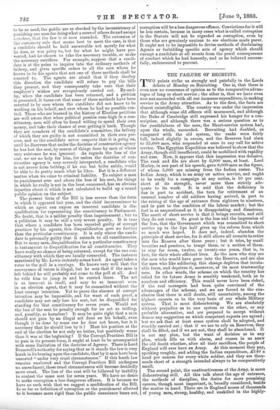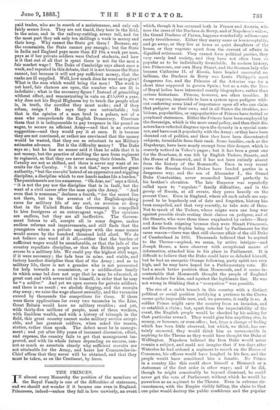THE FAILURE OF RECRUITS.
TWO points strike us strongly and painfully in the Lords debate of Monday on Recruiting. One is, that there is even now no consensus of opinion as to the comparative advantages of long or short service ; the other is, that we have even now not succeeded with all our immense expenditure, in making service in the Army attractive. As to the first, the facts are almost unintelligible. The country was under the impression that although some old officers still murmured, and although
the Duke of Cambridge still expressed his hanger for a conscription, and although there was a serious question as to the youthfulness of the men, the Short-service system had, upon the whole, succeeded. Recruiting had doubled, as compared with the old system, the ranks were fairly full, indeed slightly in excess, and the Reserves had risen to 35,000 men, who responded at once to any call for active service. The Egyptian Expedition was believed to show that the Army, though still insufficient, could be mobilised with rapidity and ease. Now, it appears that this impression was delusive.
The rank and file are short by 6,000 men, at least. Lord Morley, in one part of his speech, gave 8,000 men as the figure, of whom 5,000 are missing from the Indian roster. The Indian Army, which is an army on active service, and ought to be ready for a campaign at any notice, is 10 per cent.
short of its strength, never more than strictly ade quate to its work. It is said that the deficiency is due in part to accident, the turn for retirement of an unusual number of old soldiers having arrived, in part to the raising of the age of entrance from eighteen to nineteen, and in part to the condition of the labour market ; but the
fact is as unquestioned as it is disappointing and disastrous. The merit of short service is that it brings recruits, and still they do not come. So great is the loss and the impression of the loss, that the Government which was committed to short service up to the lips half gives up the reform from which•
so much was hoped. It does not, indeed, abandon the principle of short service, for it still allows all recruits to retire into the Reserve after three years ; but it tries, by small bounties and pensions, to tempt them, or a section of them, to stay for seven, twelve, or twenty-one years, that is, in fact, for their whole efficient lives. As the men who stay are the men who would have gone into the Reserve, and are also the men who like soldiering, this change depletes that invalu able force, and deprives it, moreover, of its most trustworthy men. In other words, the scheme on which the country has relied for its future Army is sensibly weakened, both as to numbers and efficiency. This would never have been risked, if the real managers had been quite convinced of the advantages of the scheme, and we are forced to the con clusion that there is still doubt, still uncertainty, among the highest experts as to the very basis of our whole Military system. That is most disheartening. We are absolutely without prejudice as to one system or the other, or any probable alternative, and are prepared to accept without demur any suggestion on which competent experts are agreed ; but we ask that at least some system shall be adopted, and steadily carried out ; that if we are to rely on Reserves, they shall be filled, and if we are not, they shall be abandoned. It is not any plan, but the want of decision as to any plan, which fills us with alarm, and rouses in us anew the old doubt whether, after all their sacrifices, the people of
England will ever have an Army. At this moment they pay, speaking roughly, and adding the Indian expenditure, .2140 a
head per annum for every white soldier, and they are thousands short of a strength intended always to be comparatively small.
The second point, the unattractiveness of the Army, is more disheartening still. All this talk about the age of entrance, the methods of discipline, the desire for more promising careers, though most important, is, broadly considered, beside the matter in hand. There are in England scores of thousands of young men, strong, healthy, and unskilled in the highly paid trades, who are in search of a maintenance, and only ask fairly secure lives. They are not timid, they bear in the field, in the mine, and in the railway-cutting, severe toil, and for the most part they ask only ten shillings a week in money and their keep. Why cannot the State get them ? Because, say the economists, the State cannot pay enough ; but the State in India and England pays more than £2 10s. a week per man, pays as if her private soldiers were Oxford students, and how is it that out of all that is spent there is not for the men a fair market wage ? The Duke of Cambridge says about once a week, and repeated in this debate, that it is not because the State cannot, but because it will not pay sufficient money, that the ranks are ill supplied. Well, how much does he want us to give? What is the sum which would bring the men ? The work is not hard, fair chances are open, the number who are fit is indefinite ; what is the necessary figure ? Instead of grumbling without effect, and remonstrating in vain on £15,000 a year, why does not his Royal Highness try to teach the people what is, in truth, the sacrifice they must make ; and if they
refuse, resign ? He says they are unteachable ; but that is the opinion of a man bred in a palace, not • of a man who comprehends the English Democracy. Convince them that it is indispensable to pay twopence in the pound on sugar, to secure an efficient Army—and that is an extreme suggestion—and they would pay it at once. It is because they are not convinced, or rather are convinced that the money would be wasted, that they are so reluctant to see Military estimates advance. But is the difficulty money ? The Duke says so ; but he has no sooner said it than he adds that it is not money, but the practice of shifting the men from regiment to regiment, so that they are never among their friends. The Cavalry are not so shifted, and there is never any want of recruits for the Cavalry. "It is not that," says another great authority, "but the recruits' hatred of an oppressive and niggling discipline, a discipline which to raw hands makes life a burden." The punishments are too numerous. "Oh dear, no!" says a third, "it is not the pay nor the discipline that is in fault, but the want of a civil career after the man quits the Army." "And even that is nonsense," declares a fourth, "for the secret lies not there, but in the aversion of the English-speaking races for military life of any sort, an aversion so deep that in the United States the Government is compelled to hire foreigners at an extravagant wage." The opinions are endless, but they are all ineffective. The Government listens to all, accepts all in some degree, makes endless reforms and improvements, and still finds that the youngsters whom a private employer with the same means would secure by the hundred thousand hold aloof. We do not believe one word of it all,—either that the burden of sufficient wages would be unendurable, or that the lads of the country repudiate discipline, or that the British people are averse to a military life. We could pay the highest civil wage, if it were necessary ; the lads bear in mine, and stable, and factory harsher discipline than that of the Army ; and as to military life, there is not a grandee who is not persecuted for help towards a commission, or a middle-class family in which some lad does not urge that he may be educated, at great cost and with severe toil to himself, in order that he may be "a soldier." And yet we open careers for private soldiers, and there is no result ; we abolish flogging, and the recruits stay away ; we raise the wage almost annually, and the vacancies exceed by thousands the competitors for them. If there were three applications for every two vacancies in the Line, Great Britain would have no military troubles ; and yet, with thirty-five millions of people, most of them workers, with limitless wealth, and with a history of triumph in the field, this great country cannot make military service acceptable, and her greatest soldiers, when asked the reason, stutter, rather than speak. The defect must be in management; and yet after fifty years of incessant discussion, effort, and expense, the country fails to get that management improved, and with its whole future depending on success, cannot so much as ascertain clearly why sufficient recruits are not attainable for the Army, and hears her Commander-inChief affirm that they never will be obtained, and that they must be taken, as on the Continent, by force.



































 Previous page
Previous page